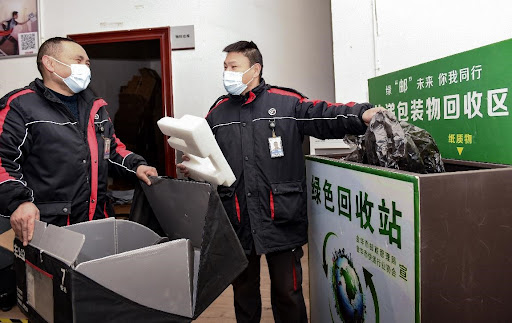A deliveryman puts packaging into a recycling bin at an outlet of express delivery company
SF Express in Jinhua city, east China’s Zhejiang province, Jan. 6, 2021. (Photo by Li
Jianlin/People’s Daily Online)
With the expansion of e-commerce, how to promote green packaging and avoid over-
packaging in the courier sector has come under the spotlight in China in recent years.
Relevant Chinese government departments, courier companies and consumers are joining
hands to accelerate the greenization of the courier sector through endeavors from reducing
and reusing packaging to optimizing the logistics system.
Just a few days ago, a resident surnamed He in Chaoyang district, Beijing, received a call
from a deliveryman, who said that the fruit she bought via an e-commerce platform arrived.
After He told the deliveryman to put the package at the door of her house, the deliveryman
reminded her not to throw away the insulated box in which the fruit is kept, and that he would
collect it later at her convenience, He recalled.
The e-commerce platform He uses has adopted insulated box for years. “Salmon, codfish and
lamb chops, which I often buy from the platform, are all kept in such boxes,” He said, adding
that deliverymen collect them for reuse every time.
Such recyclable insulated boxes represent one of the attempts of express delivery companies
to explore greener packaging.
According to industry insiders, the packaging of parcels mainly fall into six categories. As
regards the main packaging, 10 percent is envelopes, 55 percent boxes, and 34 percent plastic
bags. Besides, there are packaging fillers, tape and bags used for the transfer of packages.
Reducing packaging of parcels is an important part of promoting green packaging.
According to a warehouse manager with an express delivery company, the enterprise used
more than 50,000 recyclable boxes at a warehouse per day during China’s Singles’ Day
shopping festival this year, compared with more than 200,000 boxes and plastic packaging
materials in the past.
Another courier service provider, together with an e-commerce platform, set up 60,000 sites
to encourage the collection of used packaging, and 10,000 sites to pilot a project for reusing
packaging in wrapping up parcels, promoting package recycling in multiple forms.
To reduce unnecessary packaging and make packaging greener and recyclable, the State Post
Bureau of China (SPB) has advanced the addition of provisions on packaging governance to
e-commerce law and other laws, guiding courier companies in enhancing technological
innovation in key areas including green packaging.
In addition, the SPB has specified requirements for express delivery operations in many
documents, steadily advancing the recycling and reusing of packaging waste.
By digitizing waybills and rectifying excessive packaging, China’s courier sector has made
great progress in greenization.
Last year, the express delivery industry saved 83.3 billion sheets of A4 paper by employing
digital waybills. Meanwhile, it has reduced the layers of corrugated cardboards on corrugated
cases from five to three and even less, the thickness of packaging bags from 0.06 mm to 0.03
mm, and tape width from 60 mm and above to 45 mm and below.
By encouraging express delivery service providers to set up standard-compliant packaging
waste recycling facilities at their outlets to reuse packaging boxes and fillers in good shape
and up to standard quality and motivating deliverymen to collect used boxes and fillers at
consumers’ houses or the outlets, the SPB is building a reverse logistics chain for packaging
recycling.
Up to now, over 3.8 million recyclable packaging boxes and cases have been put into use in
the industry, which have effectively helped reduce the use of packaging boxes, bags and
fillers.
As consumers’ habits also affect the promotion of environment-friendly packaging, an
express delivery company has worked with an e-commerce platform to set up 13,000
recycling bins to encourage consumers to take part in packaging recycling.
During this year’s Singles’ Day shopping festival, they prepared 500,000 fresh eggs every day
and gave them for free to consumers who participated in relevant activities.
The SPB plans to comprehensively promote the green governance of packaging, improve
relevant laws and regulations, standards and policy systems, and continue to promote greener
and recyclable packaging and rectify over-packaging, according to an executive with the SPB.



